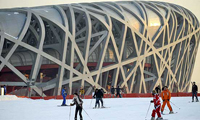 Beijing's National Stadium is on thin ice
Beijing's National Stadium is on thin iceSome call the $450-million 'Bird's Nest,' built for the Olympics, a white elephant. Over the winter, management hoped to generate revenue with a snow park, but attendance has been sparse.
People ski on a slope in front of China's National Stadium, known as the Bird's Nest, in Beijing in January. (Liu Jin / AFP/Getty Images)
Reporting from Beijing - Beijing is hosting its own version of the Winter Olympics -- though the idea may be on thin ice.
Inside the architectural wonder of the capital's National Stadium, children on rubber doughnuts race on the snow. Teenagers and adults slide slowly down a low ski slope. In the background, a band plays '90s Chinese rock on a stage flanked by fake snow peaks.
The snow park is the latest effort to create a new life for the stadium, known as the Bird's Nest.
The "Happy Snow and Ice Season" will run all winter at the stadium where Chinese directors staged a stunning opening ceremony for the 2008 Summer Olympic Games and Jamaican sprinter Usain Bolt set world records. Now slushy mounds of machine-made snow and a single ski slope occupy the grounds.
It's a long way from Olympic grandeur for the Bird's Nest, meant to symbolize China's decades of vast economic growth and status as a new world power.
With a price tag of $450 million, the world's largest steel structure has been called a potential white elephant, a big, expensive building that no longer serves a purpose. Its maintenance costs are $15 million a year.
Since the Olympics ended, the stadium has hosted an opera, an Italian soccer match and a Jackie Chan concert. Stadium management is also wooing Spanish soccer team Real Madrid to come play a game.
In January, the Beijing municipal government reported that the stadium had earned $54.2 million over the last two years. In the first year after the Games, 20,000 to 30,000 visitors, mostly from out of town, toured it daily. But as the memory of the Olympics faded, the number of visitors dropped by almost half.
The snow park was supposed to change that, but it has failed to attract large numbers.
On opening weekend, journalists outnumbered visitors. The park now gets about 300 to 400 visitors a day. The hope was to bring in at least 5,000.
"It's far from what I expected. There aren't really that many things to play with," said Ma Xiaolong, 12, a Beijing sixth-grader. He sat with his parents in a mostly empty cafeteria that sells small bowls of noodles and meat skewers. Xiaolong had pestered his parents to bring him after seeing a commercial for the "winter wonderland."
There are a few slides for children, a maze and a life-size foosball court. Volunteers dressed as Fuwa, the Olympic mascots, are ready for photos. The "World Chocolate Museum" -- or, as described by Chinese media, a "Willy Wonka-style" chocolate store -- is a small candy shop. Outside the stadium, the ski slope is only about 300 feet long.
Like Xiaolong, other visitors have been disappointed.
"I would have more fun in a playground with snow than in the Bird's Nest," read one comment on an online forum.
Next door, the Water Cube, officially known as the National Aquatics Center, is also losing a bit of face. The bubble-wrapped wonder is being transformed into a water park. But unlike the Bird's Nest, the Water Cube has been in constant use since the Olympics and is popular for its public pool, with a $7 entry fee.
The Bird's Nest is expensive. Tickets to the snow park are $26. Then visitors use a swipe card to rack up charges for rentals, games and food. They pay at the end.
"I don't know how much we've paid today. It could be as much as my month's salary," said Xiaolong's father, Ma Tianjun.
Ma, who drove an hour to get to the park, said he realized too late how expensive it would be. "Once you board the thieves' ship, you can only go forward," he said, using an old Beijing saying.
"This is a place for rich people, not poor people like us," said Ma. "We won't be coming back."
Kuo is a special correspondent.
Nicole Liu of The Times' Beijing Bureau contributed to this report.
 Beijing's National Stadium is on thin ice
Beijing's National Stadium is on thin ice